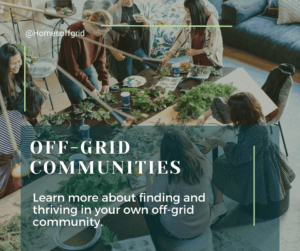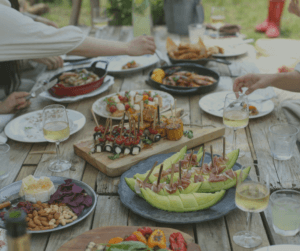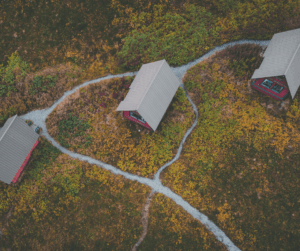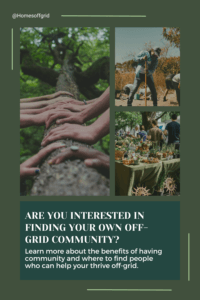Living off-grid is a rewarding yet demanding lifestyle that challenges you in ways conventional living rarely does. From managing your own energy and water needs to growing food and navigating unexpected repairs, self-sufficiency can be a full-time commitment. Add the potential isolation of rural living, and this lifestyle can quickly become overwhelming. This is why community can be so important for those living off-grid. While many still think of going “off the grid” as a life lived alone in the wilderness, the reality is that community connections are a vital element of success for most. By working together, sharing resources, and supporting one another, you can overcome challenges more effectively and create a thriving, sustainable way of life.
Being part of a like-minded community offers a wealth of benefits. Shared tools, bartered goods, and exchanged skills reduce costs and lighten workloads. Just as importantly, friendship and mutual support help combat the loneliness that can arise when living in more rural areas. This blend of collaboration and connection creates resilience and a sense of belonging – a powerful antidote to the isolation that can sometimes come with off-grid living.
No matter if you’re new to the off-grid lifestyle or looking to deepen your community ties, building and participating in a supportive off-grid network can make all the difference. Explore the many advantages of off-grid communities and discover practical advice for finding and nurturing these essential connections.

The Benefits of an Off-Grid Community
While the independence of managing your own resources can be empowering, it’s not without its difficulties. This is where the power of community truly shines. An off-grid community provides more than just practical support – it offers resilience, collaboration, and shared growth. By combing resources, skills, and support, you can create a thriving, sustainable lifestyle that balances self-sufficiency with the strength of collective effort.
Resource Sharing
In off-grid communities, resource sharing is an important component with mutual benefits. Tool libraries, for instance, make it possible to access items like chainsaws or welding equipment without the financial burden of individual ownership. Similarly, seed exchanges allow you to swap seeds and plant cuttings, increasing biodiversity in your garden while reducing dependency on outside suppliers.
The benefits extend to food, with community members bartering surplus produce or preserved goods, ensuring everyone has access to what they need. Even animal sharing can be a valuable asset. Borrowing a neighbour’s goats for grazing or a rooster for breeding encourages collaboration while reducing your own maintenance and costs. This interconnected approach helps you achieve more than you could alone, while strengthening community ties.
Skill Sharing
One of the most rewarding aspects of an off-grid community is the ability to share skills and knowledge. Workshops and classes within the group can teach valuable techniques like natural building, renewable energy installation, or permaculture. These collective learning opportunities benefit everyone and encourage continual growth.
Work exchanges are equally impactful. Helping a neighbour repair their vehicle in exchange for assistance with your solar setup builds trust and creates a system of mutuality. Collaborative problem-solving also ensures you’re never left tackling unexpected issues alone. Whether it’s troubleshooting a water filtration system or brainstorming sustainable solutions, pooling expertise makes every challenge more manageable.
Social and Emotional Support
Alongside practical benefits, an off-grid community offers essential social and emotional support. Living in rural or remote areas can sometimes lead to feelings of isolation, but shared companionship provides a powerful antidote. Having someone to talk to, share experiences with, or simply enjoy a meal alongside can transform how connected you feel in your daily life.
In times of difficulty – be it a medical emergency or the aftermath of a storm – community members can also step in to offer assistance. Whether lending a hand during tough times or simply providing a listening ear, these connections create a sense of belonging and shared purpose that keeps you going through the challenges of off-grid living.
By leveraging the strengths of an off-grid community, you can boost your resilience, lighten your workload, and enjoy the satisfaction of contributing to a network that thrives together. Whether you’re bartering surplus produce or learning a new skill, these relationships can form the backbone of a fulfilling off-grid lifestyle.
Finding and Building Community Connections
Whether you’re looking to share resources, exchange skills, or simply find like-minded individuals, there are plenty of ways to find and establish your own off-grid community. By taking an active approach, you can develop connections that provide both practical and social benefits. Building connections within any community takes effort, but the rewards are well worth it.

Local Gatherings
Attending local gatherings is one of the most effective ways to meet others living off-grid or interested in rural and self-sufficient lifestyles. Farmers’ markets, for instance, not only allow you to source fresh, local produce but also provide an opportunity to network with others passionate about the environment and alternative living. Similarly, community events and workshops often attract people with shared interests, making them an ideal place to start conversations and exchange ideas. These gatherings can spark collaborations or lead to long-lasting friendships.
Online Platforms
The digital world offers a wealth of resources for connecting with the off-grid community. Online forums, social media groups, and dedicated websites bring together individuals from across the globe to share advice, experiences, and opportunities. By joining these platforms, you can gain insights into off-grid living, ask questions, and even find nearby communities or individuals with whom you can connect. If you’re looking for advice on renewable energy systems or seeking a barter partner, these platforms make it easier to engage with others who share your values.
Joining Local Organisations
Becoming involved in local organisations is another excellent way to build community connections. Environmental groups, conservation charities, and farming associations often provide a framework for collaboration and support. These organisations frequently host events, volunteer days, and workshops. They can offer you both learning opportunities and the chance to meet others who are equally passionate about sustainability and self-sufficiency.
Reaching Out to Neighbours
Sometimes the simplest approach is the most effective. Reaching out to your neighbours, especially those living off-grid or embracing a rural lifestyle, can open doors to valuable collaborations. Initiate conversations when you encounter them in your area. From borrowing tools to sharing advice, these local connections can enrich your off-grid experience and create a sense of community close to home.
Hosting Gatherings
If opportunities to meet others feel limited, consider taking the lead by hosting your own gatherings. Potlucks, workshops, or work parties are excellent ways to bring people together. You might organise a day of collective gardening, hold a skills exchange session, or invite others to share a meal and discuss ideas. By creating these spaces for interaction, you can build relationships and strengthen the sense of community in your area.
Living in a Shared Off-Grid Community
For some, living in a collective off-grid community with communal land, shared costs, and collaborative work offers a unique approach to this alternative lifestyle. Shared resources such as energy systems, water filtration, and communal gardens reduce redundancy and increase efficiency. Pooling costs makes high-quality infrastructure more accessible, and shared financial responsibilities ease the burden on individuals. This approach also creates resilience, as members can support one another during challenging times.
Tasks like maintaining infrastructure, growing food, or managing livestock are distributed among members, enabling everyone to focus on their strengths. Dividing labour and rotating responsibilities ensure that no one is overwhelmed, while the group benefits from a diverse skill set.
Shared values, such as sustainability or simplicity, guide these communities, creating a strong sense of purpose. However, open communication and conflict resolution are essential for maintaining harmony and ensuring that everyone’s needs are met. Regular discussions help navigate challenges and keep the community aligned.

While communal living requires compromise, the rewards are significant. The shared workload lightens daily demands, while close bonds with others provide vital social and emotional support. This model offers a balance between self-reliance and collective effort, reflecting the broader ethos of sustainability central to the off-grid lifestyle.
How to Help Each Other Achieve Off-Grid Goals
Through supporting one another in practical and meaningful ways, off-grid communities can achieve more than any individual could alone. By pooling resources, encouraging each other’s ventures, and advocating for shared values, you can create a network that benefits everyone. These efforts create a foundation of mutual success and resilience, making off-grid living not just a personal journey but a collective accomplishment.
Collective Action
Working together to tackle shared challenges can be highly effective in an off-grid setting. Issues like wildlife management or maintaining access roads are often too large for one person to handle alone. By collaborating with neighbours or community members, you can divide tasks and resources, ensuring better outcomes for everyone. For instance, organising a community effort to repair a storm-damaged track or manage a local pest problem strengthens both the environment and your collective resilience.
Supporting Local Businesses
Supporting local businesses that cater to the off-grid community is not only practical but also strengthens connections within the area. By patronising renewable energy suppliers, alternative building material providers, or local food producers, you contribute to a more robust local economy. These relationships can lead to valuable partnerships, such as discounts for repeat customers or advice tailored to your specific needs. Over time, these connections can help you achieve your off-grid goals while developing a sense of mutual support.
Advocacy
Joining forces to advocate for shared values is a powerful way to support off-grid living. Collective action amplifies your voice when you work to protect land rights, promote sustainable practices, or advocate for policies that benefit self-sufficient lifestyles. Working with others to raise awareness or influence decision-makers ensures that your interests are represented. Advocacy efforts might involve attending public meetings, writing to local councils, or organising events to educate others about the benefits of off-grid living.
Learning from Experience
Sharing skills and knowledge within the community is one of the most impactful ways to help each other thrive. Whether it’s teaching a neighbour how to install a solar array, offering advice on preserving food, or exchanging tips on water management, your expertise can make a real difference. These exchanges not only help others succeed but also deepen trust and collaboration within the community.
Conclusion
Community is important for the long-term success and sustainability of off-grid living. While independent self-sufficiency is viable, collaboration allows you to address challenges, pool resources, and create shared solutions that can be difficult to achieve alone.
Strong community connections provide practical and emotional support, from sharing tools and skills to tackling larger projects or emergencies together. These relationships can significantly enhance resilience, reduce individual workloads, and develop a sense of belonging that helps sustain the demands of off-grid life.
If you’re already living off-grid or considering this lifestyle, prioritise building connections. Whether it’s through joining groups, attending events, or exchanging knowledge, engaging with like-minded individuals will expand your capabilities and enrich your experience.
By working together, you can create a lifestyle that is not only self-sufficient but also deeply rewarding and resilient.

To find out more about off-grid living explore the Reading Room.


